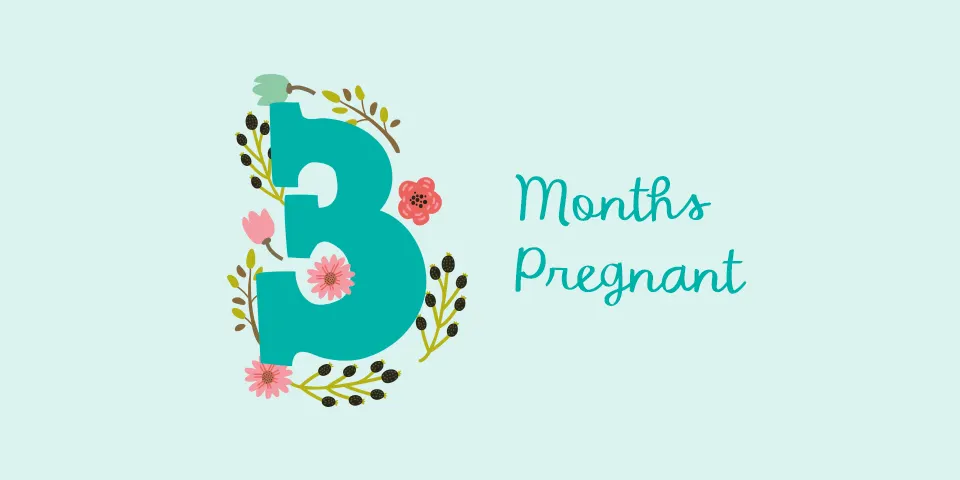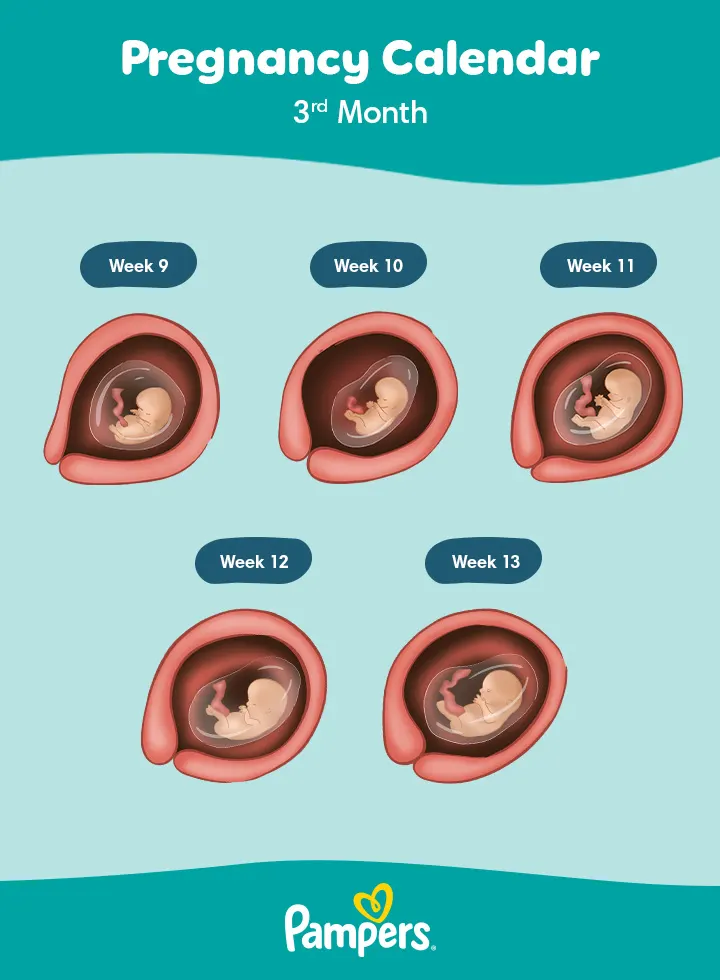3 Months Pregnant: Symptoms and Foetal Development
At three months pregnant, you’re in the final stretch of the first trimester. That’s not all: This month your little one goes from being called an embryo to a foetus – in medical circles that is! Read on to learn more about what’s happening inside your belly when you’re three months pregnant, as well as what’s behind some of the common pregnancy symptoms that many mums-to-be experience this month.
Key Takeaways
Symptoms at 3 Months Pregnant
At three months pregnant you may still be experiencing some of the symptoms of early pregnancy, and there’s a chance of some new ones cropping up too. Some of these symptoms can be quite challenging at times. Keep in mind that you may not experience them all.
Increased vaginal discharge You may experience a little more vaginal discharge than usual when you’re pregnant. As long as it’s thin, clear or milky white, and doesn’t smell bad, this is probably nothing to worry about. Tell your doctor or midwife if your discharge smells strange or unpleasant, or if it’s green or yellow, especially if you have itching or soreness around the vagina or if it hurts when you pee. These could be signs of a vaginal infection. A cottage cheese-like discharge with no smell could be thrush, a common yeast infection. Your doctor or midwife can advise you on how to treat thrush safely during pregnancy.
Nausea. If you’ve been experiencing morning sickness in the first trimester, then you may still be feeling queasy at three months pregnant, but the end of this particular symptom could be in sight: In most cases, morning sickness clears up sometime in the second trimester. In the meantime, you could try and alleviate the symptoms by staying hydrated, getting plenty of rest, avoiding foods or smells that trigger nausea, and eating small frequent meals of food that are high in carbohydrates and low in fat. Eating food or drinks containing ginger may also help ease nausea and vomiting (although you should check with your doctor, midwife or a pharmacist before taking ginger supplements while pregnant).
Skin changes. Those hormones coursing around your body at the moment can cause changes to your pigmentation. As a result, your skin may get a little darker, either in patches or all over. Your nipples and the area around them may also darken, and so could any birthmarks, freckles or moles that you already have. Most of these changes usually fade away gradually after your baby is born, although your nipples may stay a little darker even after you give birth. When you’re pregnant, your skin can be more sensitive to the sun, making you burn more easily. This means it’s important to use a high-factor sunscreen, and avoid spending too long in the sun.
Thicker, shinier hair. Not all the symptoms of pregnancy you might be experiencing at around three months pregnant are unpleasant. Many mums-to-be find that the rush of hormones they get during pregnancy gives their hair extra body and a luxuriant sheen. If this happens to you, enjoy this ‘fringe benefit’ of being pregnant while it lasts!
Breast changes. At around three months pregnant, the size and shape of your breasts could be changing around now. This is partly in response to the development of the milk ducts that will eventually supply nourishment to your newborn baby if you breastfeed. Breast changes vary a great deal between mums-to-be, but it’s possible that your breasts will feel heavier, and your nipples may also be more sensitive. Now might be a good time to go shopping for a more comfortable bra. Why not treat yourself to a professional fitting at one of the major high-street clothing chains or a specialist lingerie shop?
Fatigue. The sleepiness may continue this month as your body continues to nourish your little one. Rest when you can, stay hydrated, and do some moderate exercise, as this is shown to improve sleep. Prenatal yoga, walking, and swimming can be good choices, but talk to your doctor or midwife before trying any new exercises.
Constipation. Some pregnancy hormones can cause your digestive system to slow down, leading to constipation. The extra iron in your prenatal vitamins may also be to blame. Make sure to stay hydrated and eat more fibre. Fruits, vegetables and whole grains are great sources of fibre.
Your Baby’s Development at 3 Months
When you’re three months pregnant, your little one is now fully formed, with all his or her organs, muscles and bones in place, but there’s still plenty of growing and developing left to do before it’s time to leave the comfort and safety of your belly. At this stage the bones are still made of relatively soft cartilage, but they’re now starting to harden into proper bone. Although your little one’s head is still very large, now that you’re three months pregnant the rest of his or her body is growing fast and straightening out, giving your foetus more baby-like proportions with every week that passes. Soon you may get the chance to see for yourself what’s going on inside your belly, at your first ultrasound scan. This is usually offered between 8 and 14 weeks. A photo of your first scan is a fantastic keepsake. Sharing it via social media, email or the post can be a great way of announcing your pregnancy to friends and family. It’s a good idea to ask your hospital in advance about its policy on printing off photos or videos of ultrasound scans, and any extra charges this might entail. Although you might not find out your little one’s gender until your next ultrasound (schedule at around 20 weeks), for a little fun now, play around with our Chinese Gender Predictor. One note on finding out your baby’s gender: You don’t have to find out whether you’re having a boy or girl during the mid-pregnancy ultrasound scan if you don’t want to, and some hospitals even have a policy of not revealing the baby’s gender. If you do wish to know, tell the sonographer beforehand. Keep in mind, sometimes it’s not possible to tell based on the position the foetus is lying in.
How Big Is Your Baby When You’re 3 Months Pregnant?
By the end of this month, your foetus will be about the size of a large plum, measuring close to 7.4 centimetres from crown to rump and weighing approximately 25 grams.
What Does a Foetus Look Like at 3 Months?
Check out these illustrations for a glimpse at what your foetus might look like when you’re three months pregnant:
Changes to Your Body at 3 Months Pregnant
You might start to show a little baby bump sometime soon, but when this happens varies a lot between mums-to-be. Don’t feel left out if you still don’t look as pregnant as you might be feeling right now – it’s only a matter of time. By the way, an important change takes place inside your belly at around three months pregnant. Until now or until very recently, your little one was nourished by the yolk sac that has surrounded your foetus from the very beginning. Now, a brand new organ called the placenta is fully formed and ready to take over the job of supplying oxygen and nutrients to your growing foetus, if it hasn’t done so already. The placenta’s great trick is that it can transfer everything your little one needs from your blood to the foetal blood, without the two sets of blood actually coming into contact with each other. Your foetus will get all this good stuff via the umbilical cord, which will also be responsible for removing waste products.
How Far Along Are You at 3 Months Pregnant?
If you’re wondering how many weeks along you are at three months pregnant, there’s no standard answer to this because weeks don’t fit neatly into months. As a rule of thumb, though, three months pregnant is often defined as covering 9 to 13 weeks of pregnancy. By the end of this month, you’ll enter the second trimester, which starts at 13 weeks and lasts until 27 weeks.
FAQs at a Glance
You won’t usually be able to feel your foetus moving yet at three months pregnant. This usually happens sometime between 16 weeks and 24 weeks of pregnancy. Those first movements will probably feel like a gentle swirling or fluttering in your belly.
Checklist for When You’re 3 Months Pregnant
Plan how you wish to share the news of your pregnancy with your friends and family. Take a look at these fun pregnancy announcement card ideas for some inspiration.
Ask your doctor whether any genetic screening tests are recommended for you based on your personal situation. Ask him or her to walk you through the risks and benefits of any recommended tests and when they would be scheduled.
Read up on all the foods and drinks to avoid during pregnancy.
If you work, ask your employer for detailed information on your maternity rights and entitlement to maternity pay and leave. Your partner could also be entitled to paternity leave.
Start bonding with your little one by talking or singing to your bump, or by listening to your favourite music. It won’t be long before your foetus is able to hear your voice from inside your belly.
Pregnancy is a magical experience, but it can also be stressful and worrying at times. Talk to your partner, friends or family if you’re feeling anxious, vulnerable or just a little down. If you feel there’s nobody to confide in, your midwife or doctor can also point in the direction of support groups or professional help in your local area.
Speak to your doctor or midwife about safe exercise options that might be suitable for you while you’re pregnant.
Start doing pelvic floor exercises, if you haven’t already. These simple muscle clenches are a great way of preparing your body for labour and delivery. They may also help you recover more quickly after the birth. Even better, you can do them anywhere, anytime, without anyone else noticing.
Keep adding names to your baby name shortlist. Use our Baby Name Generator for some extra inspiration.
Sign up for even more weekly pregnancy tips here:
3 Months Pregnant - checklist


